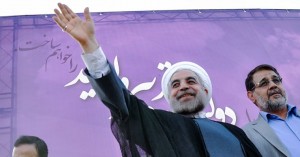 Iran and Americaís history with each other is riddled†with lost opportunities. Thus, the administration of President Barack Obama ought to make sure not to turn the†victory of a moderate Iranian president†into another lost opportunity.
Iran and Americaís history with each other is riddled†with lost opportunities. Thus, the administration of President Barack Obama ought to make sure not to turn the†victory of a moderate Iranian president†into another lost opportunity.The congratulatory message, which is supposed to be sent to the new president during the inauguration ceremony to be held on Aug. 3, ought to be a positive first step in this direction.
Conservatives in Iran will remain silent, especially since they have not forgotten the congratulatory message that outgoing President Mahmoud Ahmadinejad sent to Obama in 2009. Meanwhile, the Republicans will find it difficult to accuse the president of supporting rigged elections in Iran, since most of the US allies in the region do not even conduct elections.
What is more important than recognizing the legitimacy of the political process, in which half of the Iranian people have participated, is to give the Iranian leadership a cue that Washington is ready to reach a temporary settlement. The US has backtracked on its decision to oppose Iranís presence at the Geneva II conference regarding the future of Syria. This could contribute to a possible settlement between the two sides. This move can also be seen in the context of the arrival of a new political figure to Tehran.
Almost four years ago, Obama made concerted efforts to improve Washingtonís relationship with Tehran. In a televised message, Obama used the official name of Americaís arch-enemy ó i.e., the Islamic Republic of Iran ó for the first time†since the 1979 revolution. Obama has even gone as far as to send a message to Supreme Leader Ayatollah Ali Khamenei.
Nevertheless, these efforts were to no avail due to the unrest that arose following the disputed Iranian presidential elections in 2009. Since then, American-Iranian relations have taken a bad turn.
On June 14, however, the Iranian political scene changed with the election of Hassan Rouhani, who is seen as a moderate and pragmatic person. Observers were surprised by his victory. Despite all speculation, the elections were not a hoax or [the product of] dreary internal affairs. However, it is easy to question the change on the Iranian political arena as Rouhani has been an integral part of the regime for three decades. Some attributed his victory to a political arrangement behind the scenes, while others considered it a part of a ploy to move forward with the nuclear program. On the other hand, some claim that as long as the supreme leader is present, the president does not really play any significant role.
Nevertheless, the electionsí result did not come against the will of the supreme leader, as he was the one who allowed Rouhani†to participate in the electoral race and therefore win an overwhelming majority.
In the past, Khamenei has prevented many presidential candidates from running for elections either directly or through the Guardian Council, as was the case this time with former President Akbar Hashemi Rafsanjani.
However, he did not prevent Rouhani from tossing his hat in the ring. It should be noted that Rouhani is Khameneiís representative in the powerful Iranian National Security Council, so he is likely to enjoy the support of the supreme leader during his reign.
The president-elect is not a hostile man. He will probably disagree respectfully with the supreme leader instead of obeying his orders recklessly. Rouhani also has good relations with reformists and centrists, whom†Khamenei†has tried to alienate.
Although the Constitution stipulates that the supreme leader has more powers than the president, Rouhani can influence the agenda and basic political decisions. The rhetoric of the new president and his team will affect Iranís foreign policy and its negotiations about its nuclear power with the forces of the world.
The leadership will find it difficult to ignore the demands calling for change, which emerged during the election campaigns and materialized with Rouhaniís victory.
This change ought to break Iranís isolation, revive its deteriorating economy and find a way to lift†the sanctions†imposed on it.
Since the complex political regime in Iran prefers continuity to change, a radical change may remain a mere wish. However, change can be achieved gradually.
Today, Washington has two options: either it can help [Iran] to seize this opportunity or let it miss it. The first reaction of the White House to the election of Rouhani was not promising. Instead of congratulating the president, who won the support of a large segment of the Iranian people,†it declared†that ďdespite [the] government obstacles and limitations, the Iranian people were determined to act to shape their future.Ē
Such unconstructive factors can play a [negative] role in this regard. The sanctions that were imposed on Iran in January 2013 will enter into force next month. According to the†Iran Freedom and Counter-Proliferation Act of 2012, all transactions are banned with the sectors of energy, shipping, shipbuilding and the port in Iran.
More sanctions are likely to be imposed. In the absence of any progress in the negotiations, Iranís relations with the International Atomic Energy Agency (IAEA) are likely to take a bad turn in September. Ö
It is not easy to change these dynamics, but it is possible to avoid their aggravation. Instead of imposing further sanctions, and threatening the new Iranian administration by military force by reminding it of ďthe options on the table,Ē and that ďcontainment is not an option,Ē Obama ought to reiterate the message he launched four years ago, when he extended the ďhand of friendshipĒ to Iran.
The ball is now in his court.
By Al-Monitor
The Iran Project is not responsible for the content of quoted articles.










